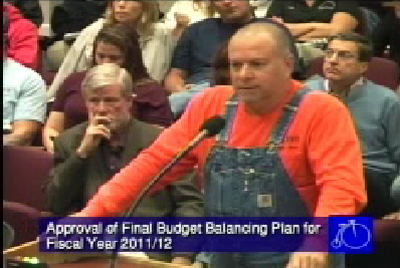
The Davis Police Officers’ Association was among the first groups to agree to a new contract last December (2012). In order to gain assurance that other bargaining units would not benefit from holding out longer for a contract, they inserted language into their agreement that grants them any additional benefits that other bargaining units obtain.
The language read, “Should any other represented employee group or association, under successor agreements to those MOU’s or agreements that are or were expired on or before July 1, 2012, accept fewer economic concessions and/or receive new and better economic provisions than those provided to ASSOCIATION under this agreement, ASSOCIATION shall have the right to receive the equivalent (sworn compared to firefighters & civilian employees compared to city miscellaneous employees) economic benefit(s) provided to the other employee group or association on a prospective basis.”
The agreement added, “In addition to voluntary agreements, this provision applies should any other represented employee group or association not agree to the same concessions or the City imposes fewer economic concessions on them as a result of impasse.”
This was the insurance policy to the DPOA that other groups would not benefit by holding out.
“Me too” clauses have become notorious, with critics claiming that they help unions and bargaining units. Critics argue that, while the city can hold itself to certain agreements such as a certain level pay increase or certain concessions, the provisions can also be quite costly and negate the give and take needed for negotiations.
For instance, the bargaining unit may wish to trade off one benefit for another. Other groups will only see the benefit, rather than the compromise that allowed that benefit to occur.
However, critics miss the possibilities of the “me too” clause in ensuring that the management, in this case the city, holds the line.
In 2005, the Davis Police Officers took a far less generous pay increase than their counterparts, the firefighters. The Davis Police Officers took a respectable 18% pay increase over the course of their contract – a good deal for them, but it paled in comparison to the 36% pay increase the firefighters received.
Those contracts produced some bad blood. Over the years, we have been told that the police believed at the time that the pay increase was unsustainable and that fire would live to regret taking such a huge increase. That belief proved accurate, as the firefighters have faced increasing scrutiny over the last four years, in part because of their huge compensation.
When it came time for the new contracts to be negotiated it was clear that fire and DCEA (Davis City Employees Association), who had gone to impasse and had their contract reversed by PERB (Public Employment Relations Board), would be hold outs. The city used the “me too” clause to their advantage on both ends of the bargaining.
By granting “me too” clauses to groups like DPOA and PASEA (Program, Administrative and Support Employees Association), the city ensured those employees that they would not be disadvantaged in their contracts by agreeing early. Fire and DCEA would not be able to gain extra benefits or reduced concessions by holding out, and if they did, the other bargaining units would get those benefits or reductions in concessions as well.
This was the insurance policy to the bargaining units that the final contracts would not be better than the first contracts signed.
On the back end of the deal was the fact that the city knew that they had to hold the line. They could not give any additional benefits to Fire and DCEA without giving to all. Given the narrow margins for the budget to remain in balance, the city could not undo the concessions.
This forced the city to push the process through to impasse, it forced the city to hold the line even when fact-finders came forth with what could have been seen as reasonable compromises.
The critics of “me too” clauses have seen ways in which the bargaining units benefit from such clauses, but have not seen how a responsible city or governing body can use me-too clauses to their advantage.
During better times, me-too clauses often would work to the advantage of employee groups as cities and other jurisdictions had benefits to give and those could be negotiated.
However, these days, governments are looking at cost savings and, with everyone settling for less money than they were previously earning, employees need assurances that everyone else is having to take the same cuts as they are.
Davis therefore has created a huge win for itself in this round of MOUs – they got the early bargaining units to agree to the cuts they believed necessary in terms of pensions, retiree health, and cafeteria cash outs. As a result, they were able to hold the line and impose the contracts on DCEA, and on Tuesday on the firefighters.
The firefighters will have a new contract imposed on them that is exactly the same as the one that the police officers voluntarily agreed to last year. The firefighters gained some benefit in that they operated under the old contract for an additional year, but even that came with a cost, as the city was forced to impose additional staffing cuts and other changes that the firefighters would have preferred to avoid.
Now both DCEA and fire will have to negotiate longer term contracts. But the impasse process has reset the status quo and no longer will the employees be sitting on house money, by receiving pay and benefits under the old contracts.
—David M. Greenwald reporting
